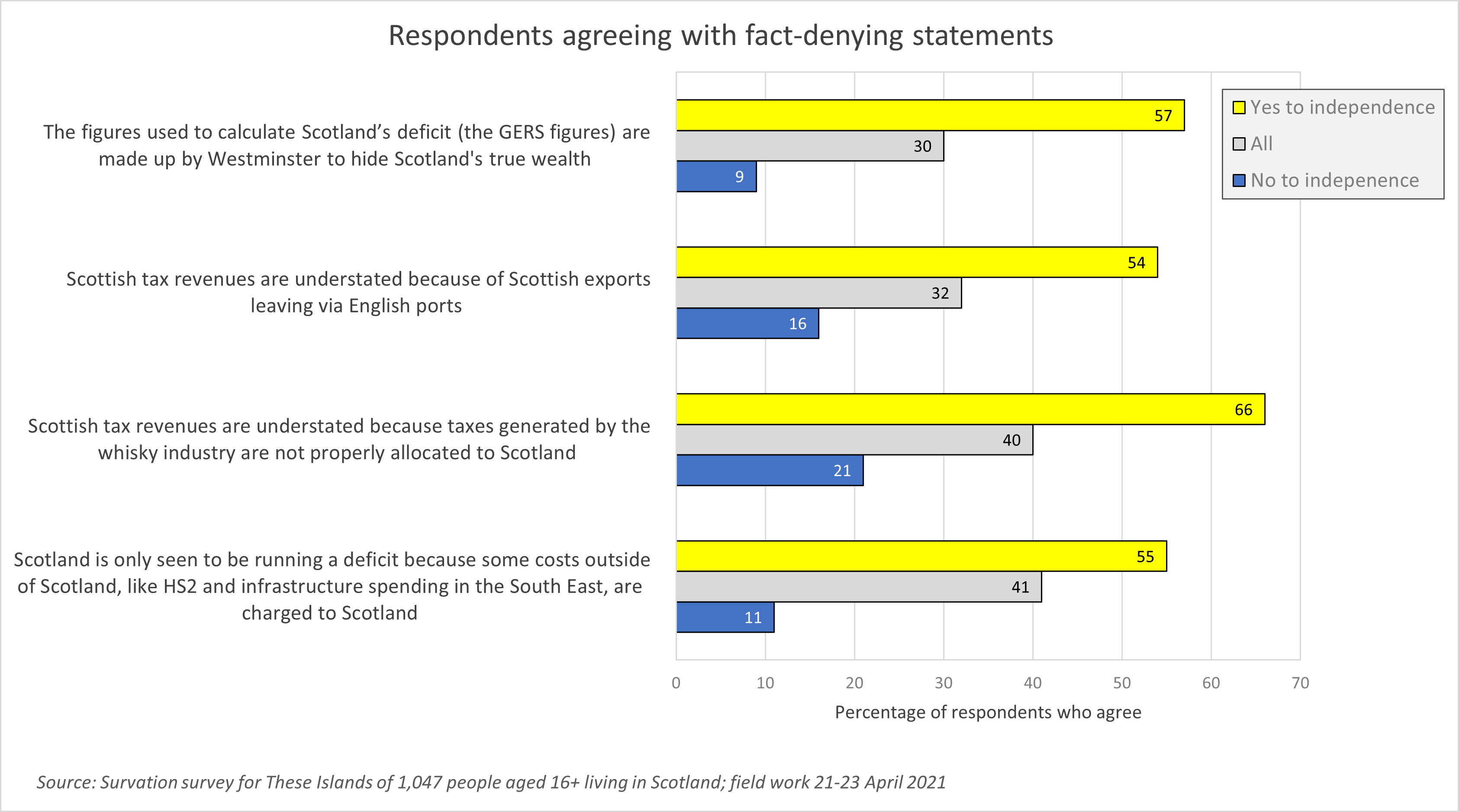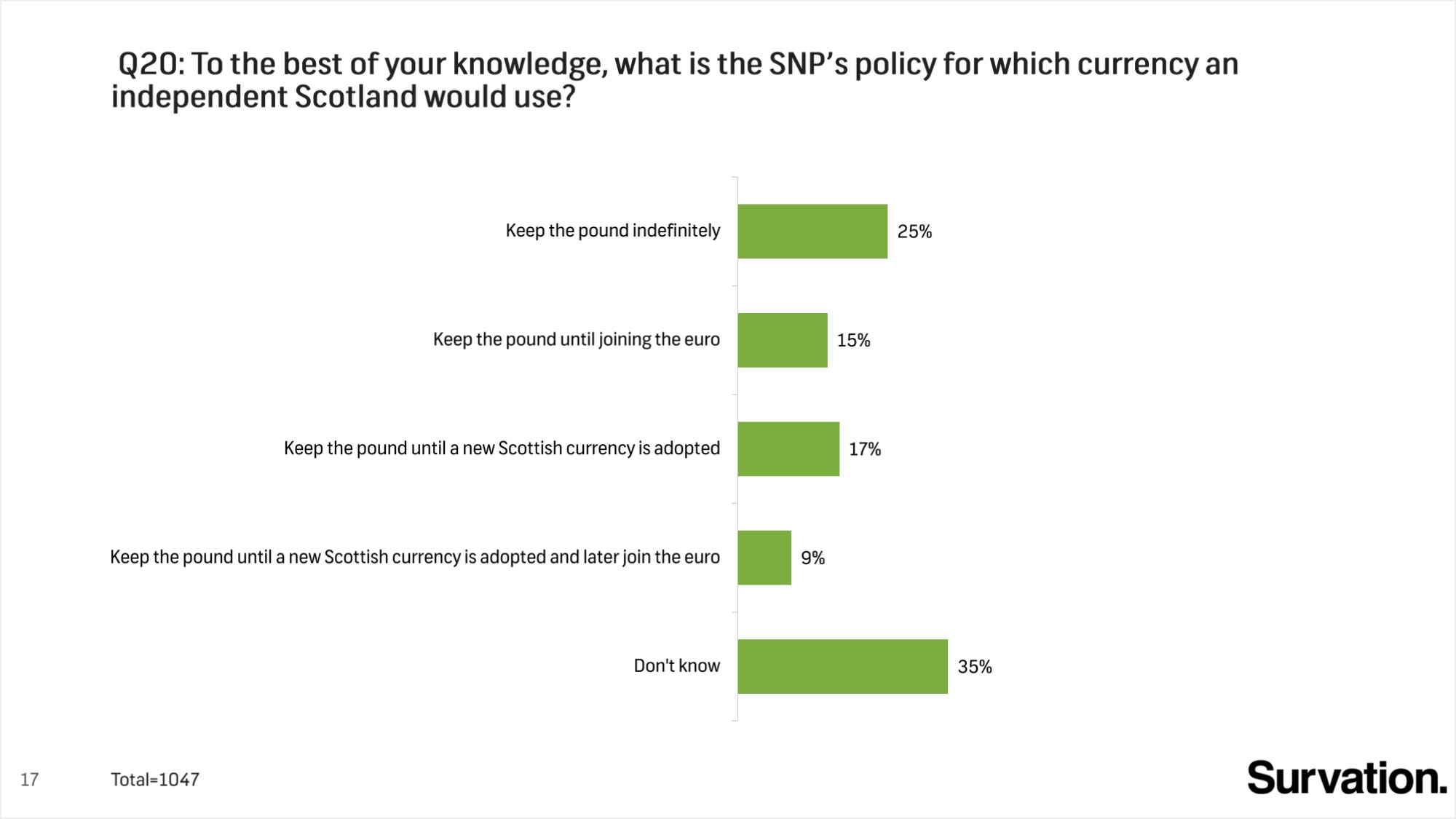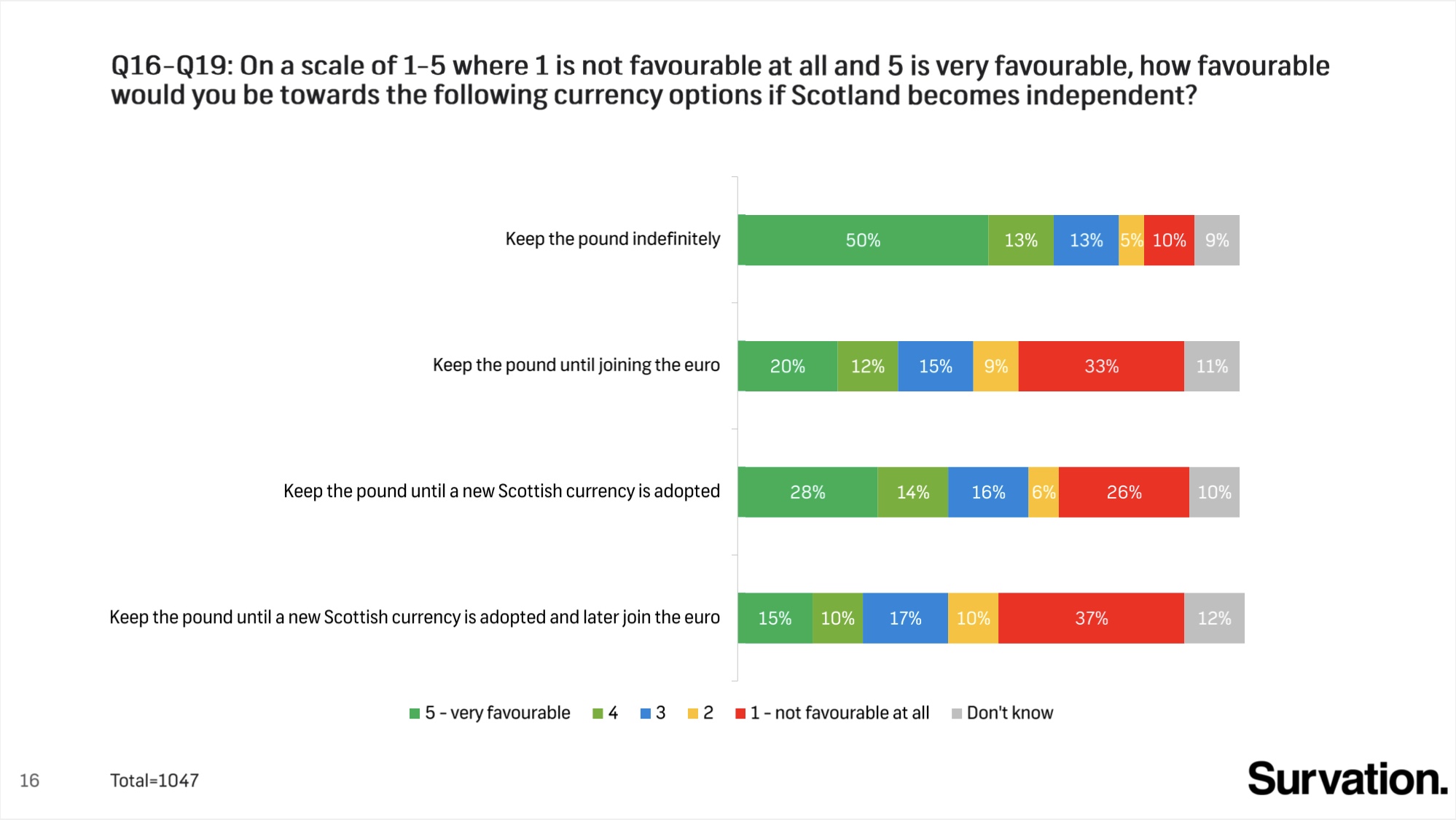SCOTTISH POLITICS IN THE GRIP OF A FACT-DENIAL EPIDEMIC
03 May 2021
A survey commissioned by These Islands has revealed widespread fact denial within the Scottish electorate and deep confusion over the SNP’s independence plans, particularly with respect to currency. Survation surveyed 1,047 people aged 16+ living in Scotland. Fieldwork was conducted 21st - 23rd April 2021.
Fact Denial
-
57% of Scottish independence supporters agree with the statement “The figures used to calculate Scotland’s deficit (the GERS figures) are made up by Westminster to hide Scotland's true wealth” and 90% of those considered the statement to be “important” or “very important” to their opinion on Scottish independence.
The reality of Scotland’s deficit position is shown in the Government Expenditure and Revenue Scotland (GERS) figures published by the Scottish Government. These figures qualify as National Statistics and are compiled by the Scottish Government’s own statisticians and economists. It should be deeply shocking that most independence supporters agree with the statement above – the figures are demonstrably not “made up by Westminster” and it is fantastical to believe that an SNP Government would choose to publish figures which “hide Scotland’s true wealth”. The First Minister is a gifted communicator, but is strangely reluctant to nail this corrosive myth.
The survey also found that most independence supporters agreed with other demonstrably false statements relating to official Scottish Government figures (myths which are widely shared on social media):
-
54% of independence supporters agree “Scottish tax revenues are understated because of Scottish exports leaving via English ports”1No tax revenues are raised directly from exports (there are no export duties in the UK) and the allocation of the economic activity that supports those exports has nothing to do with the port of export from the UK. Furthermore, although these figures have no bearing on Scottish taxes reported in GERS, even when export statistics are published by the Scottish government they are allocated based on destination, not on port of departure: “The ESS publication measures the destination of goods exported from Scotland regardless of the port from which they leave the UK.” https://www.gov.scot/publications/about-export-statistics-Scotland/pages/export-statistics-scotland-faqs/
-
66% of independence supporters agree “Scottish tax revenues are understated because taxes generated by the whisky industry are not properly allocated to Scotland”2As per footnote (1), there are no export duties on Whisky. Whisky duty is a consumption tax and so is correctly allocated in GERS based on consumption data – Scotland should not be allocated consumption duty paid by consumers in England any more than it should be allocated consumption duty paid by drinkers in France. In the same way consumption duty on French wine consumed in Scotland is allocated to Scotland, not France.
-
55% of independence supporters agree “Scotland is only seen to be running a deficit because some costs outside of Scotland, like HS2 and infrastructure spending in the South East, are charged to Scotland”3HS2 is the only infrastructure spending outside Scotland that is allocated to Scotland in GERS – no other “infrastructure spending in the South East” is allocated to Scotland. In 2018-19, £72m of HS2 costs were allocated to Scotland in GERS compared to a total deficit of £13,155m.

This denial of the Scottish Government’s economic data and belief in myths about how the figures are compiled is consistent with the survey’s finding of widespread misunderstanding about Scotland’s balance of tax and spending:
-
Only 20% of supporters of independence are aware that total public spending in Scotland is more than the amount raised in taxes4In the pre-pandemic year of 2018/19, These Islands analysis of GERS figures shows that - ignoring all international spending, defence and central government spending outside Scotland and Scotland’s share of the UK’s debt servicing costs – spending in Scotland exceeded taxes raised by an estimated £5.7 billion. This analysis has been shared with the Scottish Government economists and statisticians who are responsible for compiling GERS who were able to confirm that we have correctly interpreted the detailed data they provide on spending for Scotland. - 38% wrongly believe it is less.
This means 80% of independence supporters are unaware that public spending in Scotland is more than the amount raised in taxes in Scotland.
Commenting on the survey results, Chairman of These Islands Kevin Hague said:
This survey reveals for the first time the true scale of what amounts to a fact-denial epidemic in Scotland. We have been tracking the spread of economic disinformation in the Scottish independence debate for some time now, but we are still shocked by these findings. A desire to see a well-informed electorate should not be a partisan issue; this survey should worry anybody who believes that sound democratic processes require a well-informed electorate.
The debate about Scotland’s future in the UK is obviously about a lot more than economics, but it is clear from this survey that many supporters of independence deny (or have been persuaded to deny) simple economic facts – that cannot be healthy for democracy.
Policy Confusion
The survey also shows that, despite years of debate, the Scottish electorate remains deeply confused over the SNP’s currency policy (and supporters of independence appear as confused as the electorate in general):

The official SNP line is the third of those listed above (keep the pound until a new Scottish currency is adopted), a policy only 17% of the electorate are aware of. The confusion is understandable: it has suited the SNP to be opaque on currency and the motivation for this obfuscation is obvious when you look at the survey's findings on the relative popularity of the various options:

The only option which finds favour with the electorate is “keep the pound indefinitely”, which is inconsistent with Scotland becoming independent.
If the SNP accepts that joining the EU means committing to joining the euro, that outcome is the option least popular with voters, with only 25% in favour.5Given the need for an independent Scotland to have created a central bank and to have control of its own currency (which can be converged with the euro prior to joining), the second option in both the exhibits above is actually impossible - an independent Scotland could not adopt the euro directly from sterling
Commenting further on the survey results, Chairman of These Islands Kevin Hague said:
This survey shows that Scottish voters simply do not know what the SNP’s currency plans are. The problem the SNP face is that, while it is clear most Scots want to keep the pound, their short-term strategy of sterlingisation would be unsustainable and incompatible with their stated desire for an independent Scotland to join the EU. Joining the EU means committing to join the euro - an unpopular option.
The confusion over currency plans and evidence of widespread fact-denial revealed by this survey show that current support for independence is built on misunderstanding and misinformation.
Please log in to create your comment